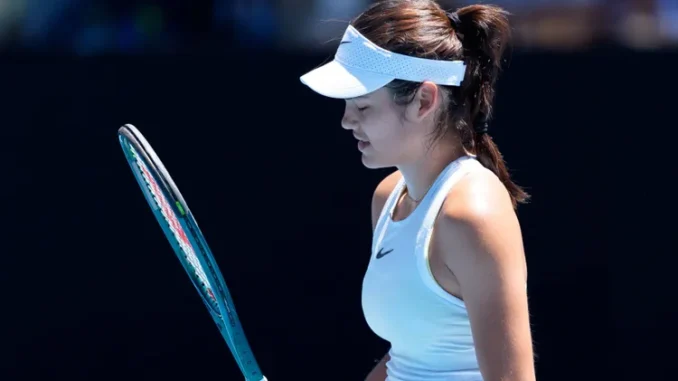
The topic of player retirements, particularly those occurring at the eleventh hour, has become a recurring theme in professional tennis, sparking debates about player welfare, tournament scheduling, and the pressures of the sport. Recently, Emma Raducanu, the young British star, offered her perspective on this complex issue, lending her voice to the ongoing conversation. Her insights, grounded in her own experiences on the tour, provide a valuable understanding of the challenges faced by players and the difficult decisions they sometimes have to make.
Raducanu, who burst onto the scene with her stunning US Open victory, has firsthand knowledge of the physical and mental demands of professional tennis. She’s experienced the highs of grand slam triumph and the lows of injury setbacks, giving her a unique perspective on the pressures faced by her fellow players. This understanding has shaped her views on last-minute withdrawals, leading her to express empathy for those who make such difficult choices.
“It’s tough, but I understand the players,” Raducanu commented in a recent interview. “We’re pushing our bodies to the limit, week in and week out. Sometimes, things happen, and you have to make tough decisions, even if it means disappointing fans or withdrawing from a tournament.”
The issue of late retirements is multifaceted. While some may view them as unprofessional or disrespectful to the tournament and the fans, others recognize the underlying reasons that often drive these decisions. Injuries, fatigue, and mental health concerns can all play a role, forcing players to prioritize their long-term well-being over short-term competitive goals.
“People don’t always see what goes on behind the scenes,” Raducanu explained. “They see us on the court, but they don’t see the hours of training, the travel, the pressure, the mental toll. It’s a demanding lifestyle, and sometimes, your body or your mind just says enough.”
Raducanu’s comments highlight the increasing awareness of player welfare in professional tennis. The sport is physically and mentally taxing, requiring athletes to endure grueling schedules, constant travel, and intense competition. The cumulative effect of these stressors can take a toll, leading to injuries, burnout, and mental health challenges.
“We’re all human,” Raducanu emphasized. “We all have our limits. And sometimes, those limits are reached. It’s important to listen to your body and to prioritize your health, even if it means making a difficult decision.”
The debate surrounding late withdrawals often centers on the balance between a player’s commitment to the tournament and their own well-being. While fans may feel disappointed when a player withdraws at the last minute, it’s crucial to recognize that these decisions are rarely taken lightly. Players often invest significant time and effort in preparing for a tournament, and withdrawing is usually a last resort.
“It’s never easy to withdraw from a tournament,” Raducanu acknowledged. “We want to play, we want to compete, we want to give the fans a good show. But sometimes, we just can’t. And it’s important to respect that.”
Raducanu’s perspective sheds light on the challenges faced by players in navigating these difficult situations. She acknowledges the disappointment of fans but emphasizes the importance of understanding and empathy. She underscores the need for players to prioritize their health and well-being, even when it means making tough choices.
“I think it’s important for fans to understand that we’re not machines,” Raducanu said. “We’re athletes, but we’re also people. We have our own struggles, our own challenges. And sometimes, we need to take care of ourselves, even if it means disappointing others.”
The conversation about player retirements is likely to continue, as it’s an issue with no easy solutions. However, Raducanu’s comments contribute to a more nuanced understanding of the complexities involved. Her perspective, grounded in her own experiences, serves as a reminder that behind the spectacle of professional tennis, there are human beings with their own vulnerabilities and limitations. And while the desire to see top players compete is understandable, it’s equally important to recognize and respect their need to prioritize their health and well-being. The long-term health of the sport relies on the well-being of its athletes, and fostering a culture of understanding and support is crucial for the future of tennis. Raducanu’s voice adds to the growing chorus advocating for a more compassionate and empathetic approach to player welfare, a conversation that is vital for the continued growth and sustainability of professional tennis.
Leave a Reply